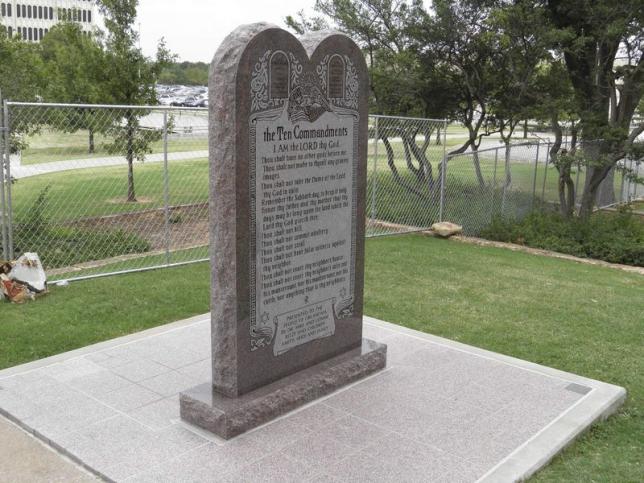Oklahoma: Controversial Ten Commandments monument removed under cover of night

The granite Ten Commandments that has sparked controversy since its installation in 2012 on the Oklahoma Capitol grounds was removed last night.
Late on Monday night, contractors started taking down the monument, after the Oklahoma Supreme Court's decision in June that it violates a state constitutional prohibition on the use of public property to support "any sect, church, denomination or system of religion".
The decision to remove the statue sparked controversy in Oklahoma and beyond, with the highway patrol increasing security around the monument in the lead up to its removal.
It will be moved to a private conservative think tank for storage.
The statue has been controversial since its installation in 2012 and led to a lawsuit by a Baptist minister, Bruce Prescott, who argued that it violated the state constitution. He said: "Frankly, I'm glad we finally got the governor and attorney general to agree to let the monument be moved to private property, which is where I believe it's most appropriate.
"I'm not opposed to the Ten Commandments. The first sermon I ever preached was on the Ten Commandments. I'm just opposed to it being on public property."
Many have taken to twitter to share their outrage about the removal of the monument:
Is the removing of the Ten Commandments from the Capital grounds AT NIGHT a metaphor for Christianity in the US? http://t.co/UZp9z0fPeY
— Scott Meier (@ScottMeier) October 6, 2015Ten commandments unconstitutional?
What, violate #1, NO other god before, ummmm, government? https://t.co/pnEHYbsxQu
— Bob Modesitt (@Scgator1414) October 6, 2015The more u take God out of schools & public places, the worse our country gets
Former State Representative Mike Reynolds, a Republican who voted in 2009 to authorise the monument, seeks to reform the constitution in order to prevent a similar occurrence: "Now we know we need to change the constitution," he said.
Several conservative lawmakers have said they will introduce a resolution in February when the legislature convenes seeking to remove the article which prevents the use of public money or property for religious purposes.











